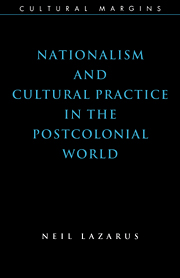Book contents
- Frontmatter
- Contents
- Acknowledgments
- Introduction: hating tradition properly
- 1 Modernity, globalization, and the “West”
- 2 Disavowing decolonization: nationalism, intellectuals, and the question of representation in postcolonial theory
- 3 Cricket, modernism, national culture: the case of C. L. R. James
- 4 “Unsystematic fingers at the conditions of the times”: Af ropop and the paradoxes of imperialism
- Notes
- Bibliography
- Index
- Cultural Margins
3 - Cricket, modernism, national culture: the case of C. L. R. James
Published online by Cambridge University Press: 02 December 2009
- Frontmatter
- Contents
- Acknowledgments
- Introduction: hating tradition properly
- 1 Modernity, globalization, and the “West”
- 2 Disavowing decolonization: nationalism, intellectuals, and the question of representation in postcolonial theory
- 3 Cricket, modernism, national culture: the case of C. L. R. James
- 4 “Unsystematic fingers at the conditions of the times”: Af ropop and the paradoxes of imperialism
- Notes
- Bibliography
- Index
- Cultural Margins
Summary
In an article on “C.L.R. James and the Politics of the Trinidadian Renaissance,” published in 1988, Hazel Carby wrote that Beyond a Boundary was “one of the most outstanding works of cultural studies ever produced.” The judgment is likely to seem less remarkable today than it did ten years ago, for the years since James's death in 1989 have borne witness to a huge upsurge of interest in him on the part of scholars working in the fields of cultural and postcolonial studies. Yet it is important to affirm the accuracy as well as the prescience of Carby's assessment, and I would like, in this chapter, to try both to build upon and to generalize from it. It is my conviction that in his writings about popular culture and philosophy, literature and politics, James reveals himself to be one of the truly decisive Marxist cultural theorists of our century. To neglect his writings would therefore, I believe, be to neglect a body of work whose stature rivals those of Georg Lukács, Mikhail Bakhtin, Walter Benjamin, and Raymond Williams. James is, moreover, almost unique among Marxist cultural theorists in taking up the question of intellectual practice as ideological representation in the explicit contexts of colonial and postcolonial social relations. A proper consideration of his work is therefore central to my concerns in this book.
A caveat needs to be entered right here at the outset, however. The problem is that James is in crucial respects unthinkable without cricket – his ideas about history and politics and culture all bear the decisive imprint of his encounter and lifelong fascination with the game.
- Type
- Chapter
- Information
- Nationalism and Cultural Practice in the Postcolonial World , pp. 144 - 195Publisher: Cambridge University PressPrint publication year: 1999
- 1
- Cited by



